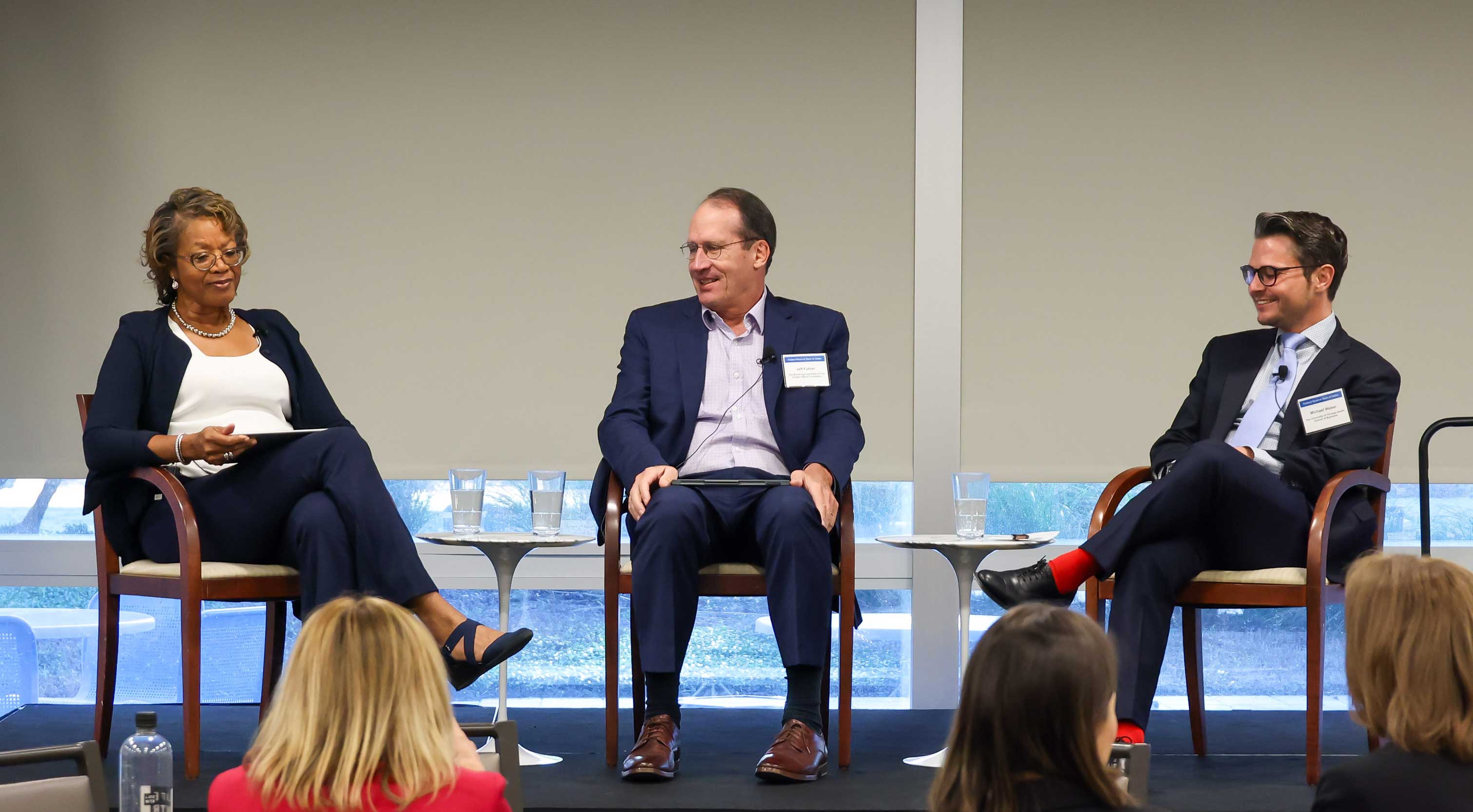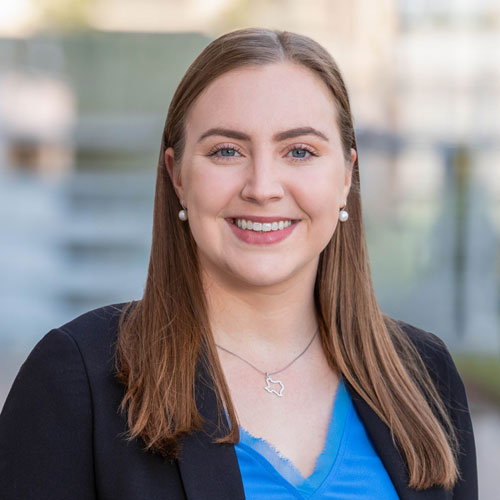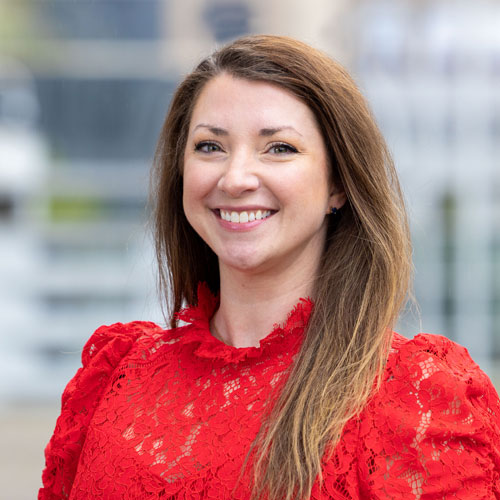
Economic Inclusion Fireside Chat: Michael Weber and Jeff Fuhrer on an inclusive economy
Michael Weber and Jeff Fuhrer visited the Federal Reserve Bank of Dallas in October for the inaugural Economic Inclusion Fireside Chat. This event was one part of the larger Economic Inclusion Seminar Series (EISS) program created to build the Fed’s thought leadership on economic inclusion. The fireside chat portion of EISS brought scholars to share their insights on economic inclusion with Dallas Fed employees and its public audience. In the inaugural event, Weber and Fuhrer provided insight into why thinking about diverse communities in policymaking is important. Additionally, they expanded on how everyone can share in our region's economic prosperity and promote full employment for low- and moderate-income communities.
Weber is an associate professor at the University of Chicago Booth School of Business and a faculty research fellow at the National Bureau of Economic Research. His research areas include asset pricing, macroeconomics, international finance and household finance. He was selected as the inaugural economic inclusion scholar for his research regarding the role of gender and racial diversity in a strong economy.
Fuhrer is a fellow at the Brookings Institution and the Eastern Bank Foundation. He is a former executive vice president and director of research at the Federal Reserve Bank of Boston, where he was also responsible for the Bank’s diversity and inclusion functions. His recent work has focused on the inception of inequalities within current societal systems and what can be done to overcome them.
Former Dallas Fed Senior Vice President Alfreda Norman, who served as head of Communications and Outreach, moderated this conversation.
The following are excerpts from the fireside chat, edited for clarity and presented by topic. The views expressed below are those of the speakers and do not necessarily reflect official positions of the Federal Reserve System.
On the importance of community engagement for public policy
Fuhrer: I started off working in monetary policy as a macroeconomist. I did models and geeky things like that, but two-thirds of the way through my career, I was privileged to have some exposure to life in low-income communities, often communities of color, and I contrasted what I saw there to what I had been taught about in economics. I realized there were significant gaps there, which folks who work in community development would not be surprised to hear about, but the run-of-the-mill economist was spending less time focusing on.
Through my work at the Fed, I have learned that economists are not trained in community engagement. We are trained to look at models and data. However, when we think about how to move the needle and bring better opportunities to diverse communities, one of the first things we need to do is engage the community in all aspects. Community engagement is a necessary part of identifying issues, thinking about solutions and the implications of those solutions. The voices of communities being served are critical. The strength of the economy will not live up to potential without this perspective.
Weber highlights the need for leaders and policymakers to be diverse in addition to the importance of understanding diversity within a community:
Weber: It’s not enough to do good policy, it is also imperative to find ways to reach the overall population. This reaching aspect requires not only giving an interview to The Wall Street Journal, because only a small subset of the U.S. will read The Wall Street Journal and get the policy message, but you have to do outreach, go into communities, explain policy and through that, you actually need to have the right messenger for that policy. It’s not enough that we only listen to J. [Jerome] Powell because many people cannot actually associate with our Fed chair; we need to also find diverse communicators.
Having a diverse set of colleagues in a group that makes decisions, such as the FOMC [Federal Open Market Committee], is imperative for many reasons. On the one hand, different lived experiences can lead to better overall decision-making. Additionally, it is important to represent the communities we are serving as policymakers. It’s important for communities being served to know that members of their community deserve a seat at the table.
The Fed needs to find ways to ensure that everyone in their communities understand policy changes and the effect they can have on the economy and individuals.
On the lasting value of a strong economy
Weber: Economics can challenge the notion that if one person is gaining, other people must be losing. As an example, rather than cutting different slices of the same pie, we can find ways to expand the whole pie. This is a representation of building a stronger economy. The “pie” of economics is not necessarily fixed, and the pie can be growing. Redistribution does not mean there are some losers and some winners. We can build a stronger economy in ways that are positive for everyone.
Fuhrer reflects on how the Federal Reserve System continues to implement programs to build and support a strong economy:
Fuhrer: The importance of the Fed Listens Project was engaging communities with whom Community Development is already connected—but the monetary policymakers not so much. One of the key messages from these communities was “You guys talk about business cycles and recession, and we are always in recession.” The benefits of running the economy hot—robust, strong growth and low unemployment —for a long period of time to communities that don’t always participate in the economy is significant. What I hope in that message we heard from Fed Listens, once we get inflation down a little bit lower, is we’ll continue to operate, and the Fed will realize the value of a long, long, healthy recovery because it reaches into so many parts of the economy that it would not otherwise.
On challenges ahead
Weber: Good policy is not enough. We need to find ways to reach the entire population. For some immigrants, there is a huge degree of polarization. I'm very concerned that even good policy will lead to a kind of flashback for certain parts of the population, because it doesn't adhere to my narrative. That's because it's from the other side of the aisle. So, it’s important to find ways that good policy is effective and not considered partisan, and I think, as part of that, it's also important to keep in mind that at the end of the day, the Fed is a nonpolitical institution.
Fuhrer: Another challenge is our political environment. It is incredibly fractious today. It is difficult for people on different sides of the divide to talk to one another without screaming, which is sad. I try to focus on highlighting what exists today, and the facts, the data and the history that explain how we got to where we are; I hope that by focusing on those things we can reach some areas of agreement on what has happened and what is, and then perhaps we can have a conversation about what to do.
One of the reasons the political discourse is so fractured is because we hold different, sometimes the same, but often different, narratives about why the world works the way it does. What's the appropriate role of government? How did we get to see these huge wealth gaps across races and ethnicities? How would they arrive? So, narratives about those things are different. It isn’t easy to change your narrative.
To hear more from Weber and Fuhrer, check out their Southwest Economy podcast interviews. Stay tuned for the next Economic Inclusion Seminar Series program.
About the authors
The views expressed are those of the speakers and should not be attributed to the Federal Reserve Bank of Dallas or the Federal Reserve System.


